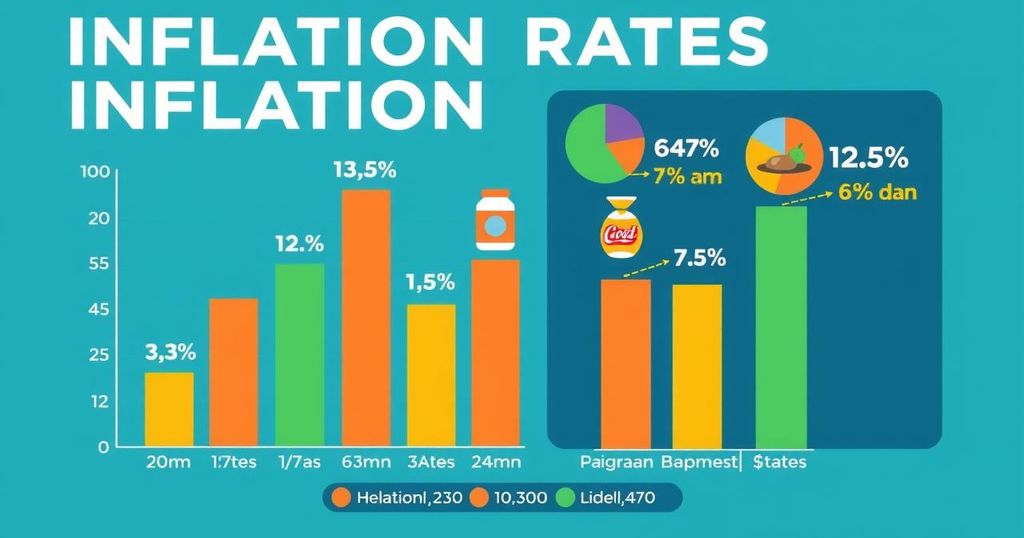Borno Tops List of Most Expensive States to Live in Nigeria, NBS Data Shows

Borno State has emerged as Nigeria’s most expensive state to live in, according to the latest report from the NBS, with an alarming inflation rate of 38.9%. Niger, Plateau, and the FCT follow with high inflation rates, primarily fueled by rising food prices and supply chain issues. Overall, the report highlights the continuing economic challenges affecting numerous states across the country, necessitating urgent interventions.
Recent data from the National Bureau of Statistics (NBS) indicates that Borno State now ranks as the most expensive place to live in Nigeria. As of May 2025, the all-items inflation rate in Borno hit an astonishing 38.9%, marking a significant issue for residents there amidst ongoing economic challenges, including high food inflation that has surged to 64.4% year-on-year. The circumstances are primarily attributed to security troubles and the displacement of farming communities.
Following Borno, Niger State has climbed to the second position with a 35% inflation rate, while food inflation stands at 30.3%. The rising prices are largely driven by ongoing transport and supply chain disruptions that continue to hamper the movement of food supplies, exacerbated by security concerns. Plateau State comes next, recording a headline inflation of 32.3%, with food inflation at 18.6% year-on-year. The increase here appears to be linked to rising costs in sectors like transportation and education.
The Federal Capital Territory (FCT), Abuja, has seen its inflation rate rise to 31.1%, with food inflation at 26.7%. Despite an overall decrease in headline inflation, a spike in food prices has contributed to the month-on-month rise in food inflation. Oyo State, located in the southwest, follows with a 28.9% inflation rate and a 19.1% food inflation figure. Although a mild deflation was noted in food access and transportation, the cost of living remains high in the region.
Nasarawa State’s all-items inflation sits at 27.4%, with food inflation just above that at 25.3%. Here, food prices have stabilized, but rising costs in energy and transportation persist. Meanwhile, food inflation in Taraba State has risen dramatically, reaching 38.6% amid an overall inflation rate of 26.5%. The state’s agricultural supply issues contribute heavily to these increases.
Additionally, Cross River State has reported a concerning spike in food inflation of 11.1%, which has contributed to an overall inflation rate of 26.1%. The NBS suggests this may relate to ongoing supply chain disruptions in the area. Rounding out the list of the most expensive states is Edo State, with an all-items inflation rate of 26%, influenced by a significant uptick in food inflation.
Benue State also features in this list at the tenth position, with 25.9% inflation, facing long-standing impacts from disruptions in agricultural activities. Just for context, prior data noted that in April 2025, Enugu, Kebbi, and Niger had taken the lead with some of the highest costs of living, indicating a troubling trend for many regions across Nigeria. This data highlights the ongoing issues with inflation and its uneven impact across the country.
According to Legit.ng, Ruth Okwumbu-Imafidon, a seasoned business journalist, emphasizes the importance of addressing these pressing economic pressures, particularly as the Central Bank of Nigeria (CBN) may need to intervene to mitigate the effects of these high inflation rates on households throughout the nation.
In conclusion, the latest NBS report reveals alarming statistics regarding inflation in Nigeria, particularly in states like Borno and Niger, which endure the highest costs of living. Rising food inflation driven by various factors—including security concerns and supply chain interruptions—has made life more difficult for citizens in these areas. As inflation rates remain persistently high, stakeholders must consider urgent strategies to alleviate the economic burdens placed on residents. The trends in these inflation statistics reflect a broader challenge that requires immediate attention.
Original Source: www.legit.ng








